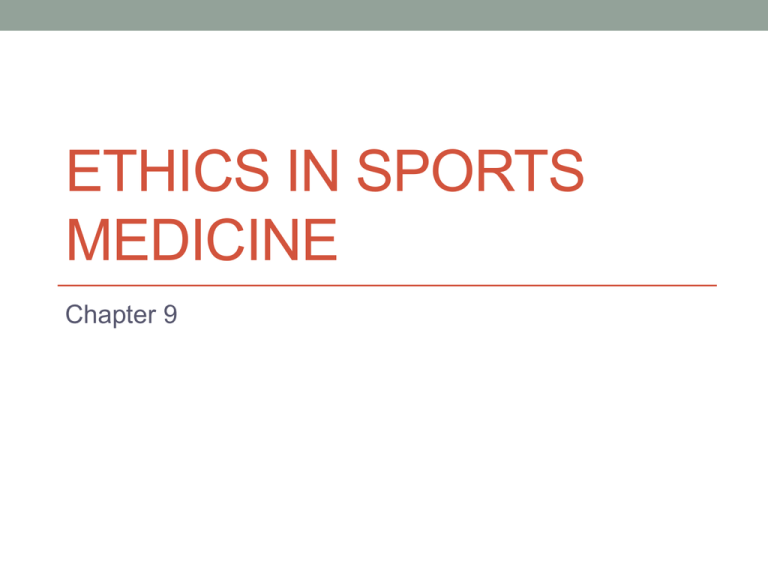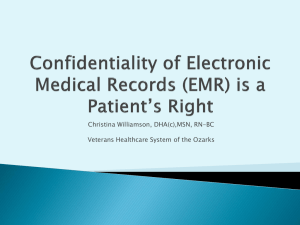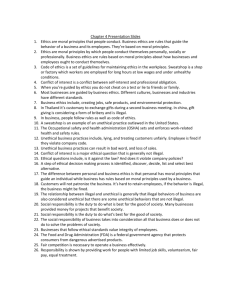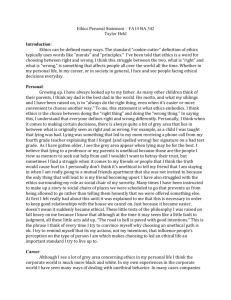Ethics in Sports Medicine
advertisement

ETHICS IN SPORTS MEDICINE Chapter 9 What are Ethics? • Help define acceptable behavior among members of a group. Professions establish codes of ethics to provide behavioral guidelines for their members and to help protect the public from the actions of unethical practitioners. Relevance to AT • Every health care profession has a code of ethics and each member must abide by them. If an individual has multiple credentials, then each code must be upheld. Code of Ethics • All are based on these Foundations: • Autonomy • Beneficence • Nonmaleficence • Fidelity • Veracity • Justice Medical Ethics • Moral philosophy that helps practitioners and others discern if and under what circumstances various health care practitioners are right or wrong. NATA Code of Ethics Members shall: 1. Respect the rights, welfare, and dignity of all 2. Comply w/the laws & regulations governing the practice of AT 3. Accept responsibility for the exercise of sound judgment 4. Maintain & promote high standards in their provision of services 5. Not engage in conduct that could be construed as a conflict of interest or that reflects negatively on the profession Relationship between Legal & Ethical Considerations • Defining a Professional • Clinician-Patient relationship (trust/confidence) • Collegial Relationships (other health care provider) • Attire and Hygiene • The Athletic Trainer as a Primary Party • To be directly involved in the situation • Are you the perpetrator of an unethical act? Unethical Acts 1. Breach of Confidentiality • The ATC serves many roles that relate to athletes/patients • Problems due to the # of people involved in the delivery of care • Coaches, administration. Colleagues • (refer of opening chapter case study) • High profile athletes and the athletic industry How to protect the confidentiality of Information and Communications • Publish policies • Establish and follow proper procedures for documentation • Control access to records • Designate 1 person to handle all aspects of information • Never disclose info in public or private unless given permission Exceptions A professional should recognize the difference between a REASON and an EXCUSE and should accept a reason as an excuse only when it is both unavoidable and justifiable. The reasons stated below would be considered excusable; any other reason would be inexcusable: • When the client is in clear & imminent danger • When others are in clear & imminent danger • When legal requirements demand the release of confidential information 2. Conflict of Interest • Always best to place the interests of the patient above all other concerns • Receiving payment for using certain products • Avoid even the APPEARANCE of a conflict 3. Exploitation • The intentional use of another person/group to achieve a selfish objective • Exploitation involves the intentional use of another person or group of persons to achieve a selfish objective The ATC as a Third Party • When you are NOT personally involved in the dilemma but you have professional responsibilities because of his/her knowledge of the situation. • The ATC has the responsibility not only to intervene in the best interest of the client but to also protect others from harm whenever there is apparent risk of harm occurring. • The ATC can act more appropriately to find a resolution How YOU become a Third Party 1. 2. 3. 4. 5. Breach of Confidentiality, Conflict of Interest, Exploitation of a Patient Forbidden knowledge Knowledge of high-risk behaviors Knowledge of illegal activities Knowledge of situations in which the welfare of the patient conflicts with the welfare of another individual or group 3 Approaches to Ethical Decision Making Choosing the RIGHT approach depends on the situation at hand Ethical Egoism 2. Utilitarianism 3. Formalism 1. Whistle-Blowing • Help clear your conscious • By not bringing forward the facts, the consequence may be too great to bear • Are there double standards if you blow the whistle? • Current laws do not do much to protect • Sarbanes-Oxley Act Recommendations • Know your professional code of ethics • Recognize the situations • Be sensitive to situations where ethical concerns exist • Consult others • Refer to a higher authority • Refer when you become a 3rd Party • Document • Follow your Conscious • Fully disclose to others all of your roles











